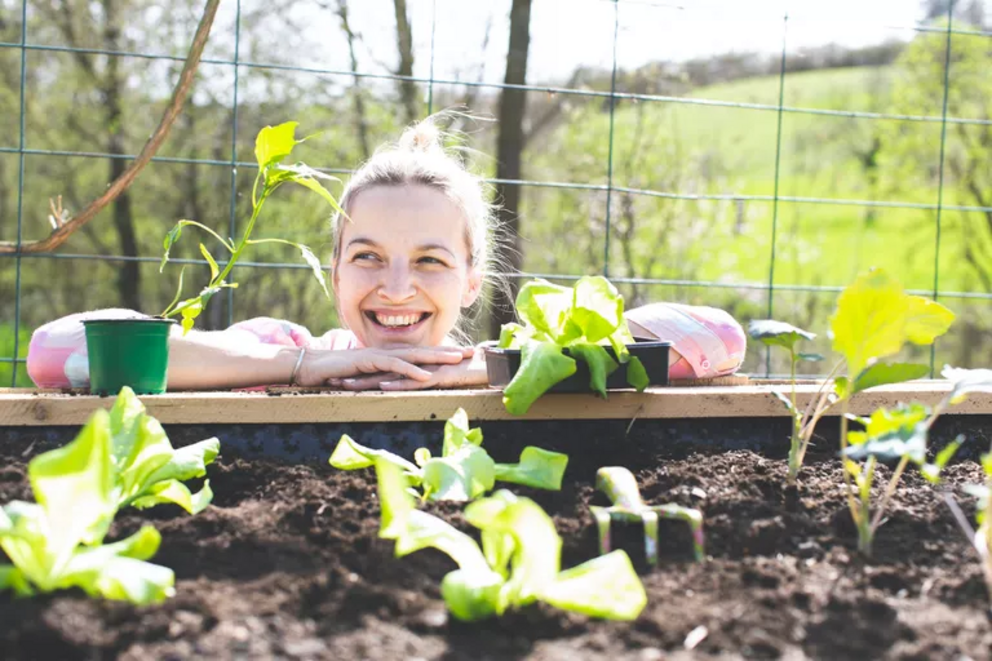A garden can solve many problems
If you want a more sustainable lifestyle, look to your garden for help.
Permaculturist Geoff Lawton once famously stated that all of the world's problems can be solved in a garden. And it's not hard to see the truth in this statement when you look at the many ways in which a garden can, indeed, help us transition to a more sustainable way of life. It provides an impressive number of solutions.
As a sustainability consultant, I work with people who are trying to live "greener" lives. I am familiar with many of the barriers that people experience and perceive as they continue on that journey. Often, effective garden design and gardening can knock down those barriers and make each small step more achievable.
Of course, not everyone is lucky enough to have a garden of their own. But those of us who do—however small it may be—should recognize what a boon it really is, and see more clearly how it can help us solve so many of our problems.
Obtaining Life's Necessities
It can be helpful, when transitioning to a more sustainable way of life, to begin by thinking about life's basic necessities and how these can be obtained. A well-designed garden can provide for more necessities than most people imagine. This goes beyond the obvious (food) to include fresh water that is caught and stored on site through rainwater harvesting, earthworks, proper planting, and careful management of the plants and soil. Many of the other things that we need for daily life can also be obtained from a well-planned garden over time.
You do not need to be a gardening expert to take advantage of natural resources. Even weeds can provide us with the things we need. From fuels to natural medicine, from fibers to natural cleaners, from crafting materials to elements for construction—plants and the natural environment are filled with resources, and these can be harnessed in many ways, even in smaller spaces.
Unfortunately, money is often seen as a barrier to sustainability. But making the most of a garden's resources can reduce the costs of daily life for surprisingly little initial outlay.
Skill-Building and Boosting Self-Reliance
No individual or household is an island, and living in our complex, interconnected world means that there is a lot over which we have no control. Many people struggle to maintain enthusiasm for lifestyle changes when they are constantly stymied in their sustainability efforts by governments, authorities, businesses, or even communities that are not as green as they are.
Taking more control over providing for our basic needs, learning skills, and building knowledge for greater self-reliance can help us feel empowered and re-energized. Though complete self-sufficiency is not an attainable goal for most gardeners, we can all move a lot closer to it. This helps us to feel calmer and better able to weather any storms that may come.
Gardening, managing your space, and utilizing the resources from your garden provides the potential to learn a range of fundamental skills—skills that are important in finding the pathway to a more sustainable future and toward reducing your negative impact. Gaining gardening skills is a gateway to learning other vital skills, such as sustainable cooking and food preservation, foraging and plant identification, herbal medicine, making a range of items for home and self-care, crafting and more.
A garden grows people as well as plants. The right garden is a nurturing environment to expand the mind and broaden the horizons.
Emotional Well-Being
Self-reliance begins within. A good mental state can give us a firm foundation on which to build resilience. A garden puts us in that state of mind which allows us to breathe, to remain calm, and to bounce back when things do not go according to plan.
Stress, anger, and other emotions are natural as we contemplate the climate crisis and the damage people cause, and see rife injustices. But such emotions, while they can drive us forward on our sustainability journeys, also hold us back. Strong emotions do not always serve as the best motivators for real and lasting behavioral change.
As many have discovered during periods of lockdown, having a garden to escape into can help keep us on an even keel. Science has shown that nature immersion and gardening bring a range of benefits to our physical and mental health and well-being.
Managing Waste
Having a garden and setting up composting systems makes it easier for us to manage food waste and to create closed-loop systems. But more than this, a garden can also be a great venue for a wide range of upcycling and reuse projects.
Mitigation of Global Crises
Through growing our own food, harvesting other resources, and managing waste, we can significantly reduce our consumption and negative impact on the planet. We can also help to sequester carbon in plants and soil through creating a sustainable and productive garden. These plants contribute to cleaning the air of pollutants and to combating biodiversity loss. They also attract and aid wildlife by offering them food and shelter. Beyond taking personal problems and overcoming certain barriers on the way to a more sustainable way of life, a garden can help us to play a greater role in tackling crises on a much broader scale.
Fact checked by Haley Mast

